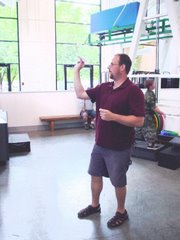I am into second week of organizational change. I was thrilled to find Breaking the Code of Change edited by Michael Beer and Nitin Nutria because it takes major themes (leadership, systems or culture, consultants, etc) and presents two strong advocates for differing viewpoints in each topic followed by a third person’s commentary and/or synthesis.
What I got out of readings for next class was a reminder of how clearly I see organizations as complex systems of multiple feedback loops that, as the system dynamics people would say, are fundamentally non-predictive. The same organization, with the same technology and people, making the same decision, may arrive at tow wildly different outcomes because of the turbulence of the environment and the nonpredictive dynamics of all those components’ interacting.
The puzzle for me in teaching this idea is how to convey the visceral sense I have of complex organizations as described above. I want the students to discover this view of reality, but I worry that such an approach will leave them either a) feeling like I am hiding something from them or b) missing the point about complex orgs.
The two chapters for Monday, by Jensen and Senge, also bring up the question of the purpose of organizations and businesses (maximize value or expand learning ability) which parallels the classic stockholder-stakeholder debate: Milton Freidman-esque (only business of business is business) stockholders first vs. Robert Freemanesque (many others have a say and are affected) negotiate among stakeholders. I can see how this debate, in turn, tends to turn on questions of human nature. Do I bring this up, or does that tend to collapse other debates and limit conversation?
